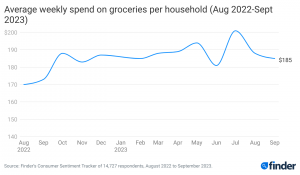Shopping at low-cost grocery stores can help stretch your dollar further, according to new research by Finder, Australia’s most visited comparison site.
Finder analysed the cost of a trolley of comparable items across three leading supermarkets – ALDI, Coles and Woolworths.
The most expensive shop cost 7% more than the cheapest option.
The total price for a basket of 46 goods from ALDI came to $199.69, followed by Woolworths at $208.85 and Coles at $214.32.
Finder Head of Consumer Research Graham Cooke says grocery bills are putting huge strain on household budgets.
“Food prices have skyrocketed over the past couple of years and despite overall inflation slowing down, high prices at the grocery store are a major pain point for consumers,” he said.
“A growing number of consumers are turning to low-cost grocery stores to find cheaper staples like eggs and bread to save funds.”
Of the 46 staples analysed by Finder, onions had one of the highest price differences between retailers of 75%.
If you are after a litre of lemon lime and bitters, you can pay 57% more from one chain to another.
The eye fillet steaks were the most expensive item on the list – with a 500g portion at ALDI costing $24.50 compared to $26 at Coles and Woolies.
Mr Cooke said shoppers who scour the different supermarkets for the best possible prices stand to save the most money.
“You don’t need to drive all around town to save $2 on your onions, but a little awareness goes a long way.
“Make a habit of checking out the weekly half-price deals at the major supermarkets so you can stock up on any of your regular purchases when they’re on sale,” he said.
“Many large grocery chains have their own apps that allow you to access special prices and collect points which you can redeem as a discount at the checkout.”
The average Aussie household spent $185 on their weekly grocery shop in September 2023 – up $15 a week compared to August 2022, according to Finder’s Consumer Sentiment Tracker.
Mr Cooke said cheaper groceries aren’t always what they seem.
“Coles and Woolies also offer loyalty points and don’t surcharge you to pay by card, so it’s worth keeping in mind if the prices are nearly the same.
“Larger supermarkets also offer a much wider range of brands, and not all the products are going to be the exact same quality,” he said.
“The no frills version of your favourite products could take a bit of getting used to.”
Nearly half (42%) of Aussies say their grocery shopping is causing them financial stress. This number has more than doubled over the last three years (19% before).

For the full list of items compared, visit finder.com.au/the-great-grocery-showdown-aldi-woolworths-or-coles-where-does-your-dollar-stretch-the-most.





